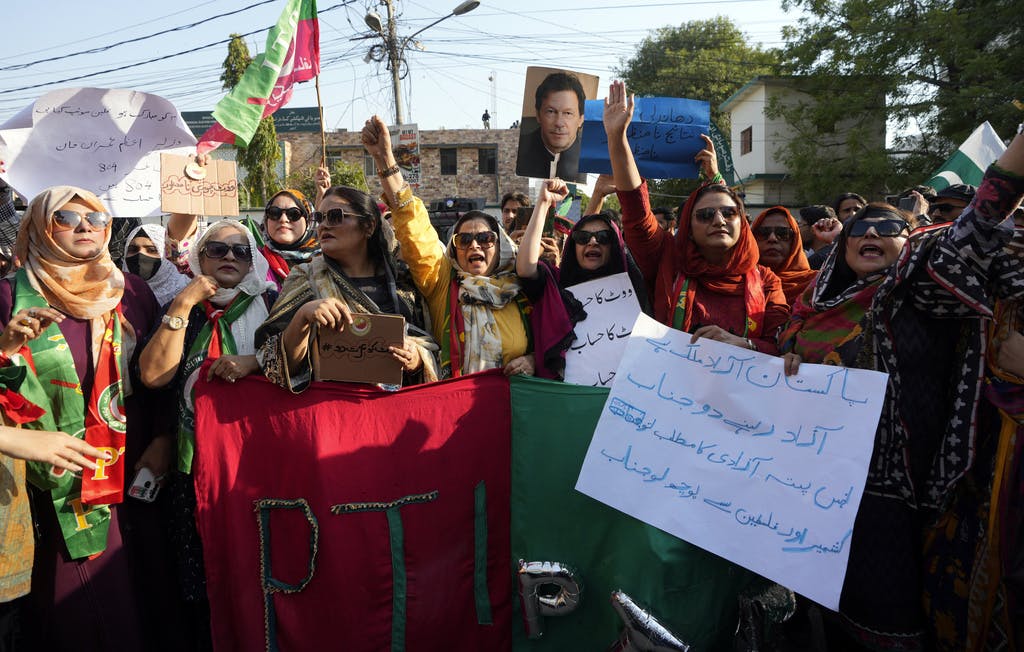Washington on the Spot After Losing Party in Pakistan Vote Moves To Form Government, Despite Unpopularity of Military Machine
A former three-time prime minister, Nawaz Sharif, stands ready to form a coalition government excluding the popular ex-premier and cricket star Imran Khan and members of his banned party.

Washington is facing a diplomatic conundrum after Pakistani elections confirmed the unpopularity of the country’s military machine compared with the popularity of a former star athlete who’s in jail — even as the head of the losing party is busy forming a coalition government.
The State Department, caught in the middle of deeply opposed factions, has been careful not to take sides while nurturing ties with the military-dominated élite. Avoiding the elections’ explosive aftermath, Washington is falling back on diplomatic tut-tutting about a troubled country at the vortex of great power rivalries.
After years of building up rapport with Pakistan’s military leader, General Asim Munir, Americans responsible for dealing with Pakistan don’t want to see the relationship fall apart for the sake of the popular former prime minister, Imran Khan, one-time captain of Pakistan’s world champion cricket team.
Mr. Khan’s adherents are demanding not only his release from prison, where he and his wife are serving multiple sentences for corruption and other alleged crimes. They also seek his right to return to the post of prime minister that he lost in 2022 in a no-confidence vote by the national assembly.
“The politicians, the courts, the string pullers and the media underestimated the people, who have many a time waited to get their right to choose,” wrote a columnist, Arifa Noor, in Dawn, the country’s leading English-language paper. “It was not just a vote for a party, it was also a message to those who robbed them of their choice.”
It’s unlikely, though, the ruling military-dominated establishment will comply with the outcome. The army’s Nawaz Sharif, a former three-time prime minister whose party finished a shocking second, would like to form a coalition government from which Mr. Khan and members of his banned party would be excluded.
Mr. Sharif’s Muslim League won only 73 seats compared with 94 or 95 seats for “independents” affiliated with Mr. Khan’s banned party. Mr. Sharif’s coalition would rely on a deal with the Pakistan People’s Party, which won 54 seats, but that won’t be easy either.
Like Mr. Sharif, the PPP leader, Bilawal Bhutto Zardari, whose mother, Benazir Bhutto, was assassinated in 2007 after twice serving as prime minister, is a member of a rival leading family and will also want a piece of the action. That seemed clear by Tuesday when Bloomberg News reported that Mr. Zardari “dropped out of the race for the top job and said his party would support any candidate proposed” by Mr. Sharif’s Pakistan Muslim League-Nawaz.
As far as Americans are concerned, it’s just as well that Mr. Khan won’t get the job. Washington has no love for a man who went out of his way to court Moscow and Beijing during nearly four years as prime minister, but the Americans also want to make a show oF standing on the side of democracy.
It was in that spirit that a State Department spokesperson, Matthew Miller, said “the United States is prepared to work with the next Pakistani government, regardless of political party.” He joined officials for the European Union and Britain in condemning “undue restrictions” as well as “electoral violence,” but those remarks appeared as window dressing masking greater concerns.
Washington’s greatest fear is that uncertainty about the results will propel the troubled country into civil strife that will ultimately lead to the rise of a military strongman who would tilt the country decisively into China’s orbit.
“In the immediate aftermath, the assembly’s dynamics are poised for turbulence,” Farwa Aamer, director of South Asia Initiatives at the Asia Society Policy Institute, told the Sun. As long as military intervention was possible, he said, “the trajectory remains uncertain, mirroring Pakistan’s inherent political volatility.”
Washington lost considerable influence after President Trump, in 2018 canceled military sales to Pakistan, accusing the government of harboring terrorists. It was not until after Mr. Khan’s downfall that American military sales resumed with a $450 million deal reached in September 2022 for American F-16 fighter jets.

